Charlie Munger said:
“The first $100,000 is a bitch, but you gotta do it. I don’t care what you have to do – if it means walking everywhere and not eating anything that wasn’t purchased with a coupon, find a way to get your hands on $100,000. After that, you can ease off the gas a little bit.”
But, why?
What’s the math behind his statement?
Saving Your First $100K
Let’s look at the math together.
Assume for a moment that you’re able to save $10,000 per year. And, let’s further assume that you’re able to earn 7% per year in interest on your investments.
How long will it take to save up your first $100K?
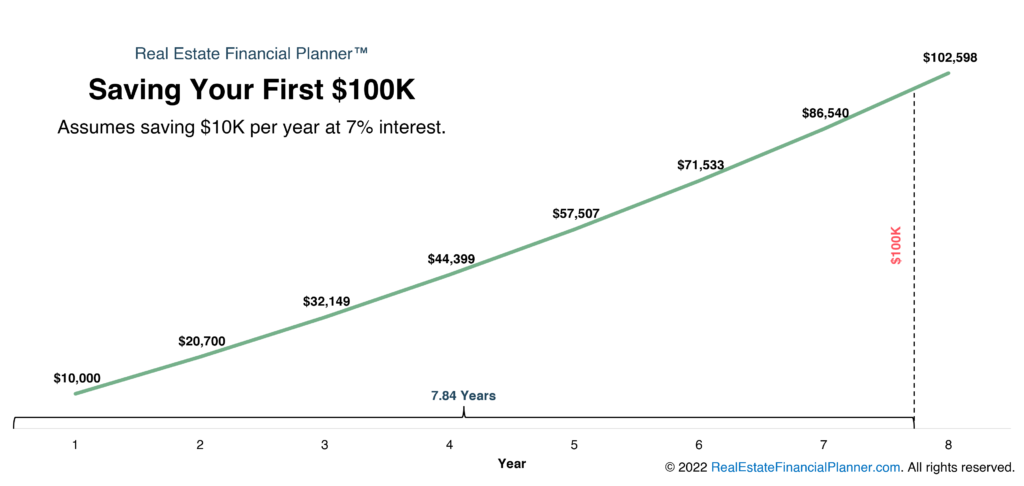
The answer, it turns out, is 7.84 years.
So, 7.84 years to save up your first $100,000.
Many folks, upon hearing this number, think it might take them almost 80 years (10 times 7.84 years) to get to a million.
But, that would be incorrect.
And, that’s why the first $100K is the hardest (and longest).
Saving Your First $200K
If you keep at it and continue to save $10,000 per year it will only take 5.1 more years to save up your second $100K.
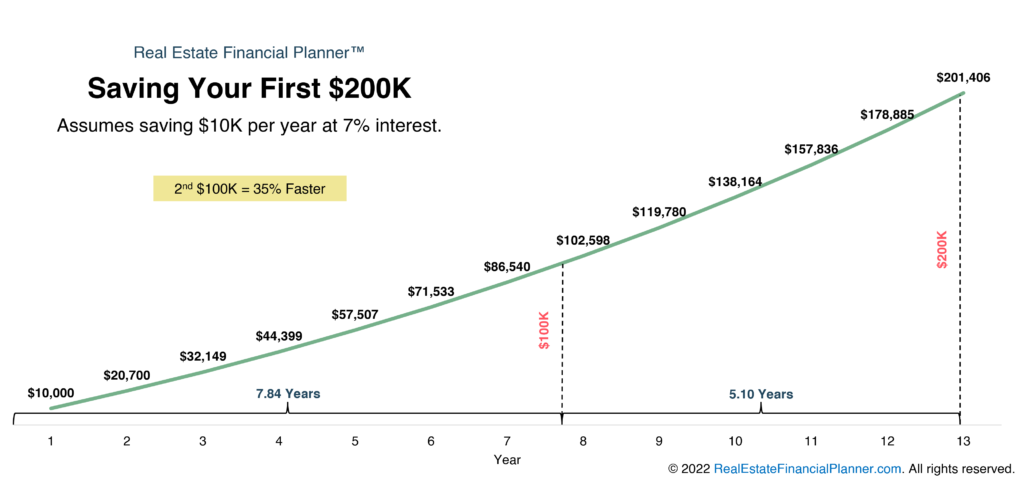
That’s 35% faster than the first $100K.
Saving Your First $500K
Let’s look next at how long it takes to save up each $100K until you get to $500K.
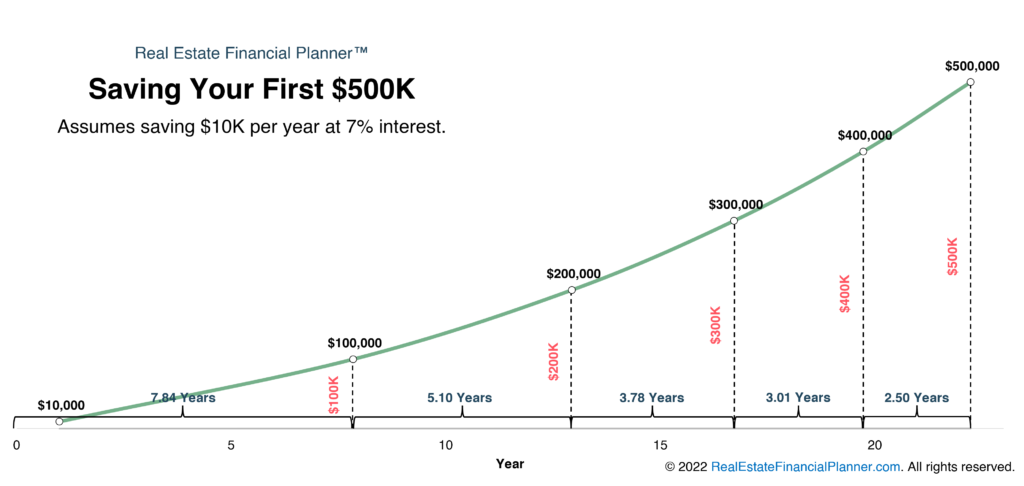
| First $100K | 7.84 years |
| Second $100K | 5.10 years |
| Third $100K | 3.78 years |
| Fourth $100K | 3.01 years |
| Fifth $100K | 2.50 years |
Each $100K is faster because you’re responsible for contributing only $10K per year additional investments while the money you have invested works for you at 7% per year.
The more money you have invested, the more the returns from that becomes responsible for earning your next $100K.
In other words, your active contribution of $10,000 per year matters less and less as the contribution from the interest earned on the money you invested matters more and more.
- For the first $100K, you contributed 7 years of $10,000 investments or about $70K of the $100K. That’s about 70%.
- For the first $200K, you contributed 12 years of $10,000 investments or about $120K of the $200K. That’s about 60%.
- For the first $300K, you contributed 16 years of $10,000 investments or about $160K of the $300K. That’s about 53.3%.
- For the first $400K, you contributed 19 years of $10,000 investments or about $190K of the $400K. That’s about 47.5%.
- For the first $500K, you contributed 22 years of $10,000 investments or about $220K of the $500K. That’s about 44%.
In all the cases above, the rest of the return that was not provided by you was from the return on the investments you already made.
Saving Your First Million
The following shows how long it takes to earn your first million with the same assumptions: you contribute $10K per year and earning 7% on the money you have invested.
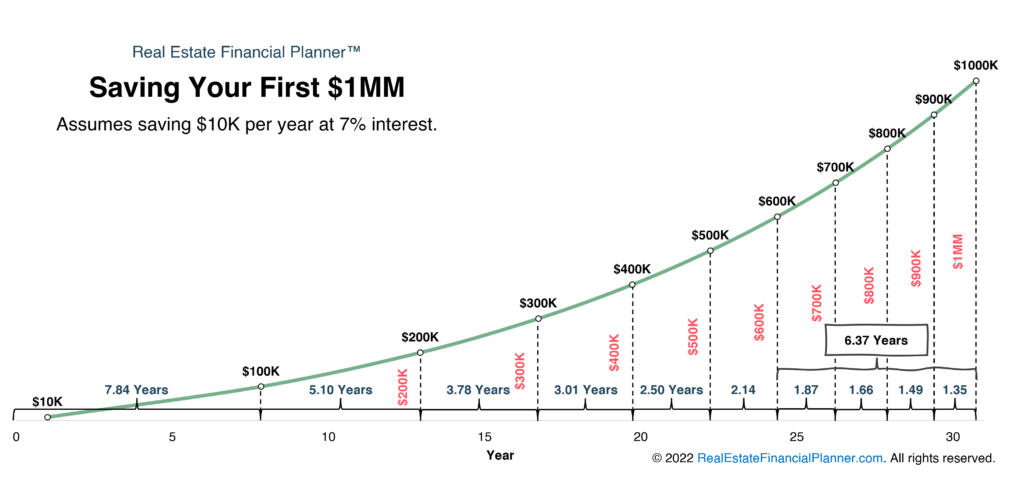
Interestingly enough, the last $400K—going from $600K to a full $1MM—is achieved in just 6.37 years. Remember, it took you longer… 7.84 years… to earn just the first $100K.
That means you earned 4 times as much ($400K instead of $100K) in less time toward the end.
Again, this is why Charlie Munger says the first $100K is the hardest and why you really need to do whatever it takes to get to that first $100K.
How Long Does It Take to Save a Million Dollars?
So, how long does it take to save up a million dollars?
The first $100K takes the longest, the second $100K is faster.
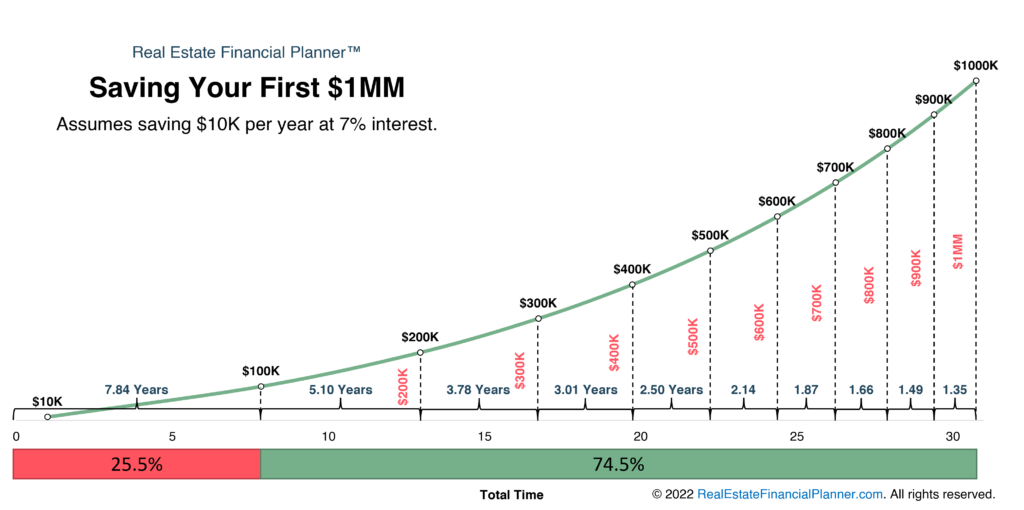
It takes about 25.5% of the time to get that first $100K and only 74.5% of the time to save the remaining $900K.
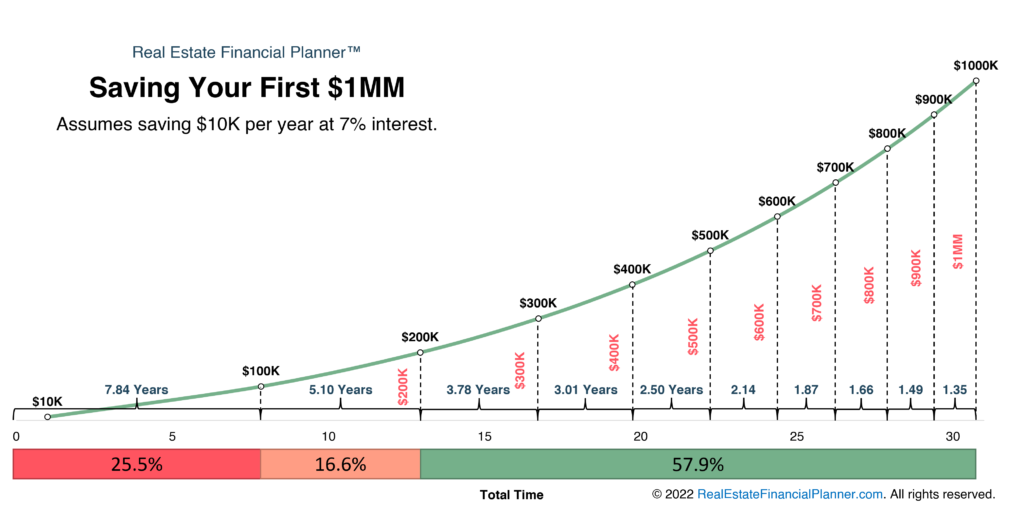
The second $100K takes up 16.6% of the total time to save up a million dollars. The remaining $800K only takes up a little more than half the time… about 57.9%.
Time To $1,000,000
The following is a table that shows exactly how long it takes to save up each $100K on your way to $1,000,000.
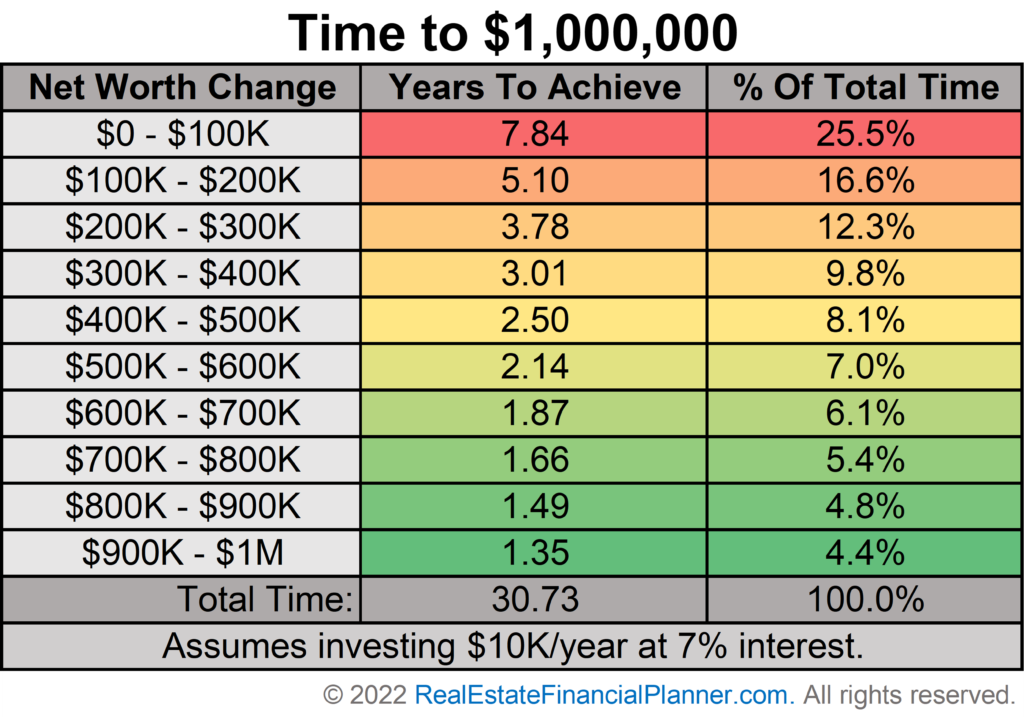
Save More or Less
- How long will it take to save up a million dollars saving just $100 per month? 60.3 years. 47% of that time is getting to the first $100K.
- How long will it take to save up a million dollars saving $200 per month? 50.4 years. A full 40% of that time is getting to the first $100K.
- How long if you save $5,000 per year? 40 years. 32% of that time is getting to the first $100K.
The table below shows a variety of amounts saved and how long it will take to earn a million dollars broken out into $100K buckets.
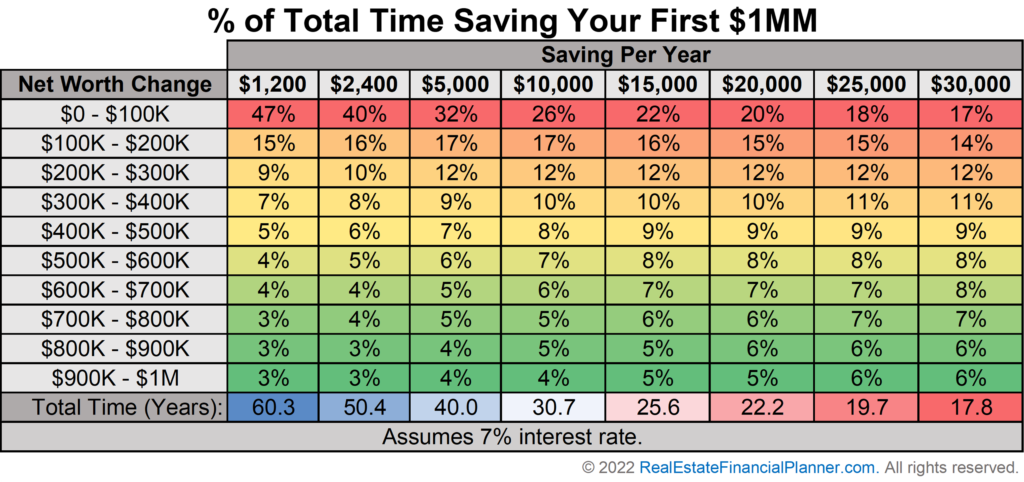
This is obvious, but the more you save each year, the faster you save a million.
Interest Rate Impact on Road to A Million
In addition to how much you save, the amount you’re earning on your investments also impacts how quickly you get to a million dollars.
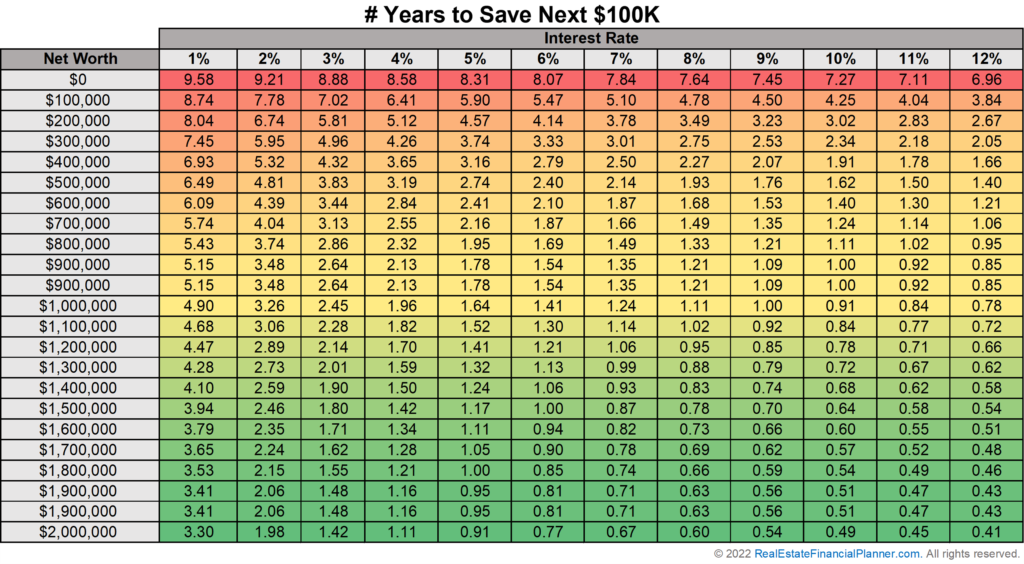
It takes 7.84 years to save up your first $100K when earning 7% per year, but if you earn 10% per year, it only changes it by about half a year, 7.27 years.
Interest rate matters a little more with the more money you have invested, when you’re earning later $100Ks. That’s because the amount you have invested is larger and therefore the return you’re earning on that has a bigger overall impact.
Buying an owner-occupant property with a 5% down payment—even without cash flow or the tax benefits of depreciation—can result in your earning in excess of 70% per year with a modest appreciation assumption of 3% per year.
If you repeat the process of buying owner-occupant properties and converting them to rental properties (using the Nomad™ real estate investing strategy), you’re likely to see significant double digit overall returns which can help you get your first $100K and ultimately your first million a lot faster.
There are even ways to buy your first home with nothing down. Two very common examples are VA Loans and USDA Loans… both nothing down loan programs. These loan programs can really help you get that first $100K.
Why You Still Might Want to Invest in Real Estate Despite High Prices and Rates, and Lagging Rents
James talks about why the first $100K is the hardest and why… despite high prices, high interest rates and lagging rents… now might still be a good time to invest in real estate in the following webinar recording:
Assumptions
A deeper dive into the assumptions.
When you’re saving the $10,000 per year, I made it super conservative and said that you did not actually get your $10,000 until the very end of the year.
That means that you don’t earn any interest on the $10,000 that you saved in that year until the very start of the next year.
That’s why for year 1, you have $10,000 and not $10,000 plus interest.
That’s also why for year 2, you have $10,000 from year 1, the interest you earned on the $10,000 you saved in year 1 and $10,000 from year 2 for a total of $20,700.
If you save the $10,000 each year in monthly installments and can earn some of your money on the amount you’re putting in each month, your results will be a little faster… especially early on when you don’t have a lot of other money already invested.